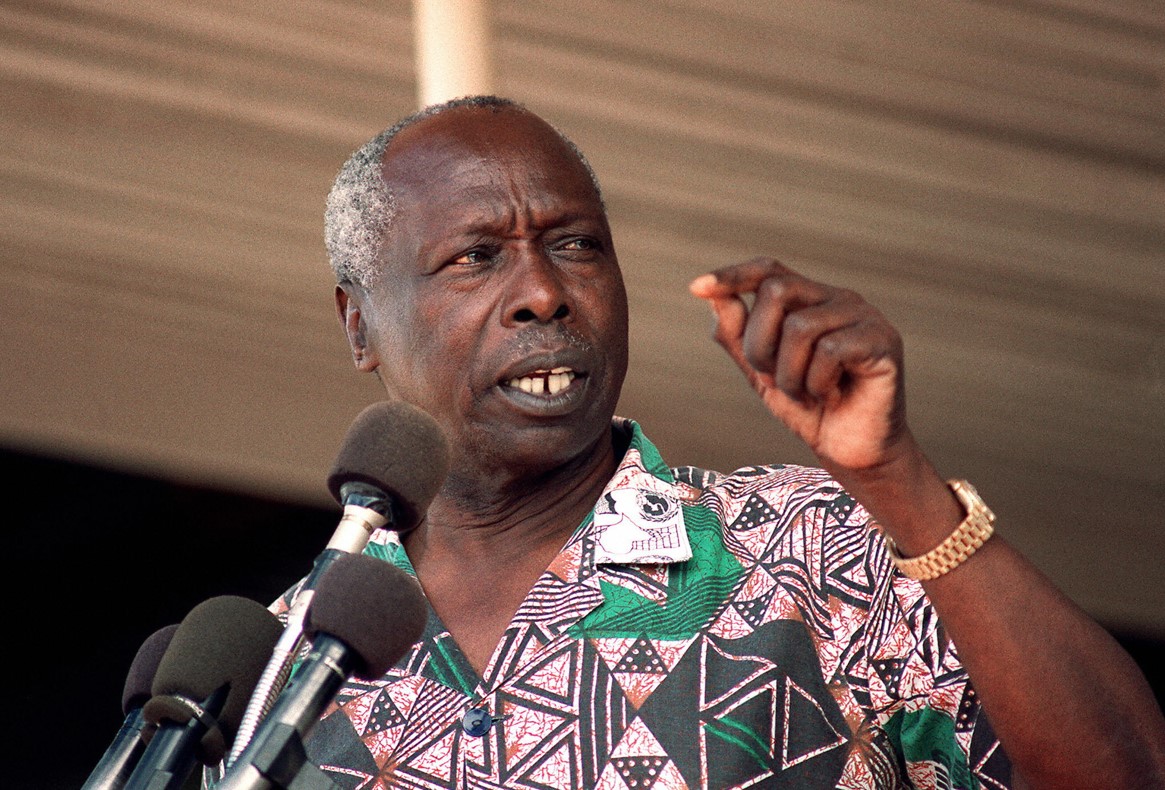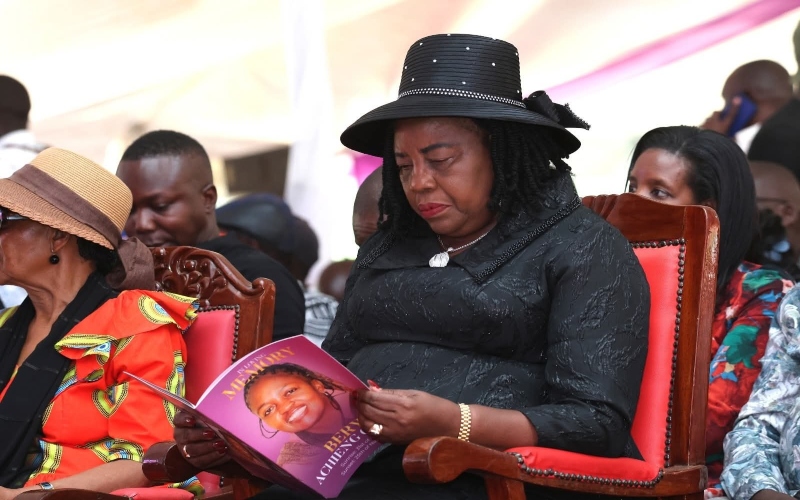Toxic secrets: Moi regime accused of dumping nuclear waste in Northern Kenya

The allegations have sparked widespread outrage on social media, with many Kenyans calling for accountability and demanding that MPs from Northern Kenya take action in parliament.
Former Minister Cyrus Jirongo has revealed secrets that former President Daniel Moi's regime knowingly dumped toxic nuclear waste in Northern Kenya, leading to a high prevalence of cancer cases in the region.
In an interview with Lawyer PLO Lumumba, Jirongo revealed that he had obtained classified documents from Jimmy Choge, the lawyer of Nicholas Biwott, also known as "Total Man", who was the most powerful figure in President Moi's cabinet at the time. The documents allegedly contained sensitive information about the dumping of toxic waste in Northern Kenya, including the specific locations and details of the allegations.
More To Read
- Wajir police nab suspect with AK-47 rifle in ongoing crackdown on illegal firearms
- Government unveils national action plan to boost hazardous threat response
- Northern region MPs accuse President Ruto of ignoring region in State of the Nation Address
- Diamond Trust Bank lands in Garissa, ignites push for financial inclusion in northern Kenya
- Study shows women under 50 face higher risk of colon growths from ultra-processed foods
- Study reveals why colorectal cancer resists immunotherapy
"Mzee, I have information that people in the Ministry of Energy are cheating Kenyans by saying that they are looking for oil, but it is toxic waste that is being dumped in North Eastern and around that area," Jirongo revealed.
"I've never been in trouble like that, because I was asked, Where did you get the documents from?" Jirongo recounted his conversation with Moi, who is said to have become furious when confronted with the evidence.
"Moi even issued threats, warning me that if I didn't reveal my sources, it would be the end of me."
At one point, the president's security is said to have stormed into the heated meeting between Jirongo and Moi, believing a physical altercation had occurred.
"He was ranting loudly; his security had thought I was fighting him," Jirongo recalled.
After the meeting, Moi warned Jirongo not to reveal any details of their discussion to anyone.
"Whatever we've discussed here, if I ever hear it outside there, utajua (you'll know me)," Jirongo recalled Moi saying.
Jirongo believes that Moi's reaction suggests complicity in the alleged plot.
"I thought about what I was doing and questioned whether I was talking to the person who was dumping the waste because that appeared to be the reason behind his angry reaction," the former minister said.
The allegations have sparked widespread outrage on social media, with many Kenyans calling for accountability and demanding that MPs from Northern Kenya take action in parliament.
Dadaab MP Farah Maalim also expressed his long-held suspicions of toxic waste dumping in parts of Kenya, specifically in Lagdera, Wajir, and Marsabit. The alleged incidents are said to have occurred in the late 1980s and early 1990s.
It was 1988 if memory serves me well, when the company allegedly dumping toxic waste set up shop in #Garissa and #Wajir. They curiously named it Kenya Oil Service -"prospecting" for oil. They recruited numerous local labourers who told tales of digging trenches where sealed…
— Hon. Mohammed Adow (@Moadow) April 7, 2024
Farah recounts his efforts to chase away foreign entities, including the US Marines, who wanted to drill boreholes in Lagdera, which he deemed suspicious. He also reached out to the United Nations Environment Programme (UNEP) in Gigiri, but they were unhelpful.
The MP is now calling for a Parliamentary Select Committee to investigate the matter, citing the need for experts to examine the sites for radioactivity. He believes it is essential to get to the bottom of the saga and ensure justice for the affected communities.
Indeed that has been my suspicion for the the longest. This happened in late eighties & early nineties. I only succeeded is chasing them from Lagdera. The US Marines also wanted to drill boreholes in parts of Lagdera which in my opinion was suspicious. I told them we didn’t…
— Farah Maalim EGH (@FarahMaalimM) April 7, 2024
STATEMENT ON TOXIC WASTE DUMPUNG IN NE KENYA:
— FCPA Billow Kerrow (@BillowKerrow) April 7, 2024
A prominent Kenya leader, Hon Cyrus Jirongo, has revealed in a televised
interview that the Government authorised the dumping of hazardous toxic waste
in North Eastern Kenya in 1980s by Western firms licensed ostensibly to
explore… pic.twitter.com/1uyZ1HZy4c
In 2014, the then-Standard Media Group's crime reporter, Dennis Onsarigo exposed the devastating reality of cancer-stricken residents in Marsabit and Mandera Counties.
The investigation, dubbed "Desert of Death," revealed a tragic tale of suffering, with young children, mothers, fathers, and grandparents succumbing to stomach and throat cancer due to contaminated water.
Onsarigo's investigation linked the cancer cases to human activities in the region, particularly the presence of toxic wells dug by a foreign oil company about 30 years ago. Researchers found excessive levels of mercury and other harmful chemicals in the wells, the primary water source for residents and their animals.
In Kargi village alone, the local hospital reported a staggering 64 cancer cases, with doctors receiving three new cases every week. A government report recommended the wells' closure, citing suspicions of toxic dumping in the area. However, despite these warnings, dozens continue to fall ill to this day.
Experts, including foreign specialists, have examined the water and deemed it unfit for human and animal consumption. Tragically, over 2,000 cattle have died after drinking from the contaminated wells as of 2014.
In 2014 Ktnnews undertook an in-depth investigation into widespread cancer cases in Marsabit County. From Maikona to Kargi, tens of people were in their final stages of dying from stomach and throat cancer.
— DENNIS ONSARIGO (@Donsarigo) April 7, 2024
I went back there years later and I found new cases; those I had…
The situation remains dire, with residents struggling to access proper medication and healthcare. The youngest cancer patient, a three-year-old boy, succumbed to the disease just weeks after Onsarigo's visit.
Around 1984, in Marsabit County, Amaco Corporation conducted oil exploration. The company, which signed a Sh691 million agreement with the government, dug five oil wells, including Sirius-1, Bellatrix-1, Chalbi-3, and Hothori-1, on a vast 14,000 square kilometres of land.
However, the excitement of potential oil wealth was short-lived as an increasing number of cancer cases began to emerge in 2006. The National Environment Management Authority of Kenya (NEMA) sent a delegation to investigate and found high levels of mercury and nitrate in the region's water, rendering it unfit for consumption.
Despite the findings, residents continue to use the contaminated water, leading to an increasing number of cancer deaths. A filter installed to lower contamination levels is no longer in use, and experts warn that there may be more substances left behind during the excavation that pose a threat to the community.
The situation is dire, with many residents unable to afford early cancer screening or specialised treatment. The rising number of graves serves as a stark reminder of the plight of the forgotten community.
Cancer is Kenya's third-leading cause of death, claiming thousands of lives each year. According to the World Health Organisation (WHO), Kenya had an estimated 47,887 new cases of cancer and 33,418 cancer-related deaths in 2020 alone.
Top Stories Today














































